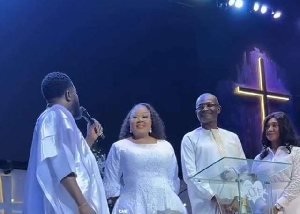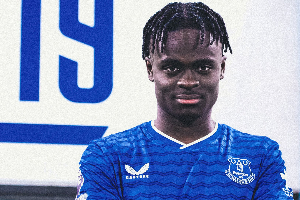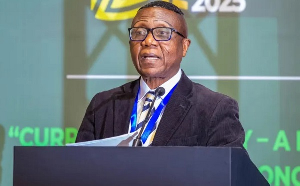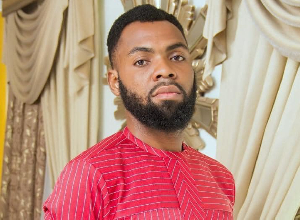By Kwesi Atta Sakyi
24th June 2012
It is common in the literature of knowledge to come up with models which are a simplification of reality. Thus far, this is the fourth and final part of my discourse on leadership in Ghana; and specifically on the topic, ‘What type of Leadership Style Do Ghanaians Want?’ Many people will agree with me that leadership is from God, because every national leader is anointed of God for a particular purpose. People may be apprehensive of the high leadership turnover rate, as we want continuity and stability, yet we crave for change. How we can reconcile these diametrically opposed variables is difficult to comprehend. Be that as it may, may I straight away launch into my leadership models which I have formulated or devised, upon some reflection? My leadership model is based on animals, elements and physical features. They are eight (8) in number. These are the Bird Leader, the Lion Leader, the Rock Leader, the Ocean Leader, the Tornado Leader, the Tree Leader, the Snake Leader and the Busy Bee Leader.
Bird Leader
A bird leader is a leader who hardly stays in his nest, yet he works very hard outside to observe developments overseas and to bring new ideas home. As we know, there are varieties of birds such as weaver birds, eagles, vultures, the raven, the lark, sparrows, woodpecker, and the owl, among others. If our leader is a weaver bird, then he is a workaholic as he works ceaselessly, developing public infrastructure. If he is an owl, he is full of wisdom and he might be a good statesman, diplomat, unifier and problem solver. If he is a woodpecker, then we are doomed as he will be pulling down structures and institutions put up by his predecessors. If he is an eagle, he soars above all and sets lofty goals for his people. He develops the helicopter view and rises above petty tribal sentiments. Such a leader is very vigilant of state security and jealously guards state assets. If he is a vulture, then we are doomed as he engages in procrastination and he is engaged in scavenging, fault-finding and finishing off state assets. If he is a raven, then you have a big thief on your hand. If he is a sparrow or a lark, then be prepared for an astute propagandist and rabble rouser, who will croon you to sleep and achieve nothing. Such a leader does not walk his talk, as he only gives promises which are never fulfilled, and he loves his own voice more than anyone else, so he does not listen to advice. Such a leader may have charisma and be a crowd puller.
Lion Leader
The lion leader is fearless and he preys upon his own subjects. He adores being worshipped and served. It is worse if he is male, as he expects his wife to call the shots behind the scenes for him (kitchen cabinet or spousocracy). Such a leader loves to be feared and he rules as a dictator and autocrat. Instead of serving his subjects and protecting their welfare, he keeps them in his pen as a breeding yard for his dinner. His subjects expect nothing good from him but the dread of being taken unawares for his dinner. Since the lion is fearful because of its rueful roar, the subjects keep a good distance from him. Such a leader pursues self aggrandizement and he can really go shopping, using state revenue. If he is an old male lion who cannot hunt, he lurks around human settlements and preys upon passers-by and stray domestic animals. Politically, this is the tired political leader who never gives up and wants to die on the throne, hence he eliminates people around him who nurse the ambition to succeed him. Leadership grooming and succession plan are not in his dictionary. Such a leader believes in the saying that a revolution consumes its own people. He may have several wives and concubines. Here, he behaves like pre-French Revolution (1789) King Louis, who exclaimed, ‘The state is myself (L’etat c’est moi).’
The Rock Leader
As we all know, a rock is an inanimate physical entity. It does not move nor breathe or eat or grow or die. It is there perpetually, like the Rock of Gibraltar or the Central Massif or the
inselbergs and monadnocks or granite tors. The Rock Leader is like a Greek Temple, who never changes as he is dependable, reliable but insensitive to changes around it. This is the leader who is impervious to reason. To him, the past, the present and the future do not make any difference because they are all along a continuum. The sun will shine, temperature will go below zero or soar high, it will rain and the sun will shine fiercely. All these do not impact on the rock. The rock leader stays very long on the throne and achieves practically nothing, except as a symbol of continuity and stability. This leadership fits the advanced economies of MEDCs, which have very little room for economic growth. Such a leader can be predicted because like a rock, there is no variation. He sees and hears what is happening around him but he cannot talk. Thus, whenever there is chaos, mayhem, bedlam around him, he cannot intervene. This leader believes in the status quo ante. Whenever there is chaos in his kingdom, he is unruffled because when the rage subsides, he will be champion remaining, as if nothing ever happened.
The Ocean Leader
We all know that the ocean is vast and deep as it covers a larger percentage of the earth’s surface. The ocean leader is calm and pacific on the surface but below it, a lot lurks in the form of subterranean volcanoes, subterranean forests, deep ocean chasms and trenches and fishes of diverse hues, sizes and nomenclature. The ocean leader is difficult to read or predict. Many insults can be hurled at him but he can absorb all of them from the media and remain placid on the surface, but seething with vehement rage beneath. No one knows when he will strike in the form of storms, tsunamis and killer waves. He is a vast repertoire of knowledge, ideas and wisdom. The ocean leader is a builder as well as a destroyer (in Akan language, Okumfuor odomfuor). I think this is my own ideal of a leader as all human beings have their good nature and bad nature. Only a hypocrite pretends to have only positive attributes or claims to be sacrosanct and affects a holier- than- thou attitude. The ocean leader is also like a fire brand leader because fire can build and it can destroy.
The Tornado Leader
The wind cannot be seen but it can be felt and when it gathers force and momentum to graduate from a gale to a storm, hurricane and tornado, then you have something on a regional scale. When a hurricane (like Katrina in SE USA in 2005) passes, it leaves massive destruction in its wake, including flooding of settlements, power blackouts, disease and economic paralysis. A tornado leader is full of action and fury and he is less likely to be reflective as he acts on impulse. He always regrets some of his actions years later. He is noted for stormy statements and he does not think through his actions. He acts before he thinks. He is a real disaster. He may only be useful as a transitional and transformational leader. Like the Lion leader, he scatters his subjects by his fury, hence causing heavy exodus of citizens into the Diaspora. The Tornado leader believes in no theory but only hands-on practical approach.
The Tree Leader
One of the best forms of leadership is the tree leader. A tree gives shade, provides wood as a resource for construction and furniture, provides paper, provides fertilizer to the soil on its demise, provides fruits and food items, provides oxygen and cleans the environment, it beautifies the landscape and its roots prevent rill, gully and sheet erosion. Animals (climbers, creepers) and birds find solace in a tree, thus, the biblical expression, The Tree of Life. The tree grows upwards and towers above the landscape, surveying all the things around. The tree can provide herbs and cures. It can provide fibre for clothes, ropes, twines and wood for transport (canoes). Railway sleepers are made from teak wood and some kitchen utensils are made of wood. Miners use wooden props in the alleys underground to support rock surfaces. A tree leader is the best form of leader because he provides all the needs of his people and does not harm anybody. He is stationary and sees all passers-by and what they do. Thus, a tree leader is very observant and knows the characteristics of all his people. The movement of the tree is geotropism, phototropism, thigmotropism, hydrotropism, among others. This means a tree leader is very sensitive to external stimuli, hence his high concern for the welfare of his constituents. I will leave the reader to reflect on which of our Ghanaian leaders past and present, fits the tree leader type.
The Snake Leader
The snake is a symbol of craftiness. In some tribes, it is symbolic of the ancestral spirit. The snake leader chastises his subjects and causes panic among them. He is a symbol of torment and hellfire for his people. This is a pretender type of leader who is unforgiving. He can betray the country and play a double game with outsiders to take over national assets.
The Busy Bee/Ant Leader
In the bee colony, we have the Queen laying eggs, the drones who are unproductive lazy bones and loafers, the worker bees who run the economy and make honey, the soldier bee that guards the state assets. For purposes of this essay, I will focus on the worker bee leader. This type of leader is a nation builder who causes construction of new schools, hospitals , roads and railways, ports, airports, power generation plants, factories and imposing state edifices. These are the Lee Kuan Yews, Franklin Roosevelts, Peter the Greats (Russia), Mahathir Muhammad, Konrad Adenaurs and Yakubu Gowons (Nigeria) of this world.
An Alternate Composite Leadership Model
Leadership can be conceived as an input-output model or a hierarchy in the food chain. It consists of:
The Landlord Leader (Efiewura)
This leader is an elite class and of the bourgeoisie. He is a leader who delights in imposing and collecting heavy taxes from his subjects. If he is good-hearted, he may use the taxes to benefit his people. If he is the selfish and greedy type, he lives off his subjects as he dissipates tax revenue on the welfare of himself, his cronies and relatives. A particular party in Ghana has been notoriously famous for exacting heavy taxes on Ghanaians year in year out, yet the standard of living has never improved. The Efiewura type of leader may enjoy partying abroad and travelling overseas frequently.
The Entrepreneur Leader
This leader employs the three factors of production, land, labor and capital in innovative ways to build the economy. He is a thinker, builder and planner and organiser. During his tenure, the nation experiences or records high GDP growth. He is a good tenant as he pays his dues on time. He creates wealth in all the sectors, both forward, backward, lateral and horizontal linkages are created in the value and supply chains. The Entrepreneur leader is resourceful, action-oriented, and proactive and he cares about the welfare of his workers. Ghana currently needs an entrepreneurial leader for our much needed take off.
The Harvester Leader
This leader does not sow but he reaps where others have sown. He does not do the chase or kill, but scavenges after the predators have done the kill and had had their fill. He acts like a hyena or a vulture, prowling the plains in search of carrion and leftovers after the overkill. Sometimes, he acts like a monkey who sees man planting the fields with maize and he muses to himself, ‘why does man toil so much in the sun and rain? After all, when the maize is ready for harvesting, I will be the first to taste the first fruits.’ This harvester leader may be a thief of national assets as he comes to loot with his cohort. He may act like a squirrel, raiding the groundnut and bambara beans farms. He may be a bandit and a rascal. He is a deviant leader and he is despicable. These are the leaders who buy mansions abroad, send their children to English and Swiss boarding schools, and they buy themselves expensive limousines and private jets. These are the leaders whose reign may trigger coup d’états or rebellions.
The Worker Leader
We have followed a processional whole or hierarchy in our analysis thus far. From the Landlord to the Tenant or Entrepreneur, to the Harvester. Now we look at the Worker Leader. This leader is an administrator, caretaker, maintenance officer, curator, bureaucrat and agent. He is tied to the apron strings of his principals or pay masters who propelled him to power. He is a proxy leader who does not take his own decisions as he is not his own man. He takes instructions from his pay masters or employers, who may be foreign multinationals or entrepreneurs. This leader shows no patriotism and he can sell state assets for a song. He is heavily in cahoots with his foreign benefactors and he panders to their entreaties and caveats. This leader establishes a comprador class, ruling on behalf of foreign agents and apparatchiki. This leader is a traitor or a sell-out. He is a hired agent and an economic assassin. As a pure economic man, he works to rule and he is a clock watcher.
The End User Leader
In the food chain or the input-output model, end-users are those who use the products produced or services delivered by the producers. The end users in the political arena are the citizens. However, in our leadership paradigm, the End User Leader is one who benefits from the efforts of previous leaders. He is a throne -warmer. His tenure is characterised by no new development in terms of infrastructure. He does not set up new businesses. He puts his reign in auto-pilot and we could call him President Do-Little. He is just a consumer. He spends extravagantly and he is a profligate or spendthrift. He may indulge in setting up numerous commissions of enquiry, whose reports do not amount to anything.
The Decomposer Leader
This is the last part of the food chain and also the end of the input-output model. The Decomposer Leader is a leader who recycles and decomposes waste matter. He is like the worms, mushrooms and bacteria that turn decayed organic matter into soil. This leader is ingenious and an innovator, who is a lemon squeezer. He is efficient and can use little to achieve much. Now you the reader should try and figure out which of our past and present leaders fit the typologies which I have outlined in the four part series. For me, I think a leader may fit more than one of the typologies, that is, if he is an all-rounded figure. I myself I think I belong to the worker type of leadership and I may be a tree kind of leader. See you next time. Chao!
Contact: kwesiattasakyi449@gmail.com
Opinions of Tuesday, 26 June 2012
Columnist: Sakyi, Kwesi Atta














